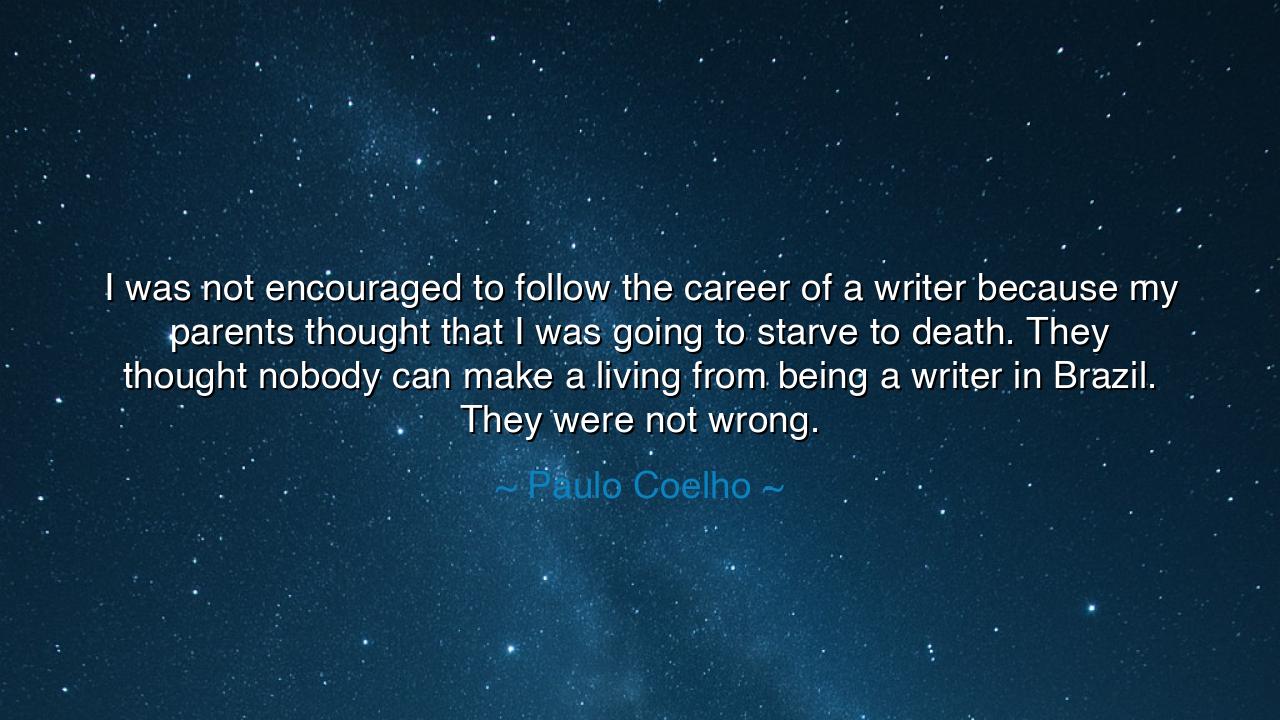
I was not encouraged to follow the career of a writer because my
I was not encouraged to follow the career of a writer because my parents thought that I was going to starve to death. They thought nobody can make a living from being a writer in Brazil. They were not wrong.






"I was not encouraged to follow the career of a writer because my parents thought that I was going to starve to death. They thought nobody can make a living from being a writer in Brazil. They were not wrong." Thus spoke Paulo Coelho, the wandering sage of words, whose own life became the parable of perseverance and destiny. His confession is not one of bitterness, but of irony—a wry acknowledgment that even those who love us most may not always believe in the dreams that call our souls. Yet within this humble reflection burns a truth older than any nation: that the path of the artist, of the visionary, of the one who listens to the whispers of the spirit, is rarely paved with comfort or certainty.
In the land of his birth, Brazil, Coelho’s dream of writing seemed almost foolish. The world around him was pragmatic, struggling, grounded in survival. His parents, like many of their generation, equated safety with conformity. They did not mock his ambition; they feared it. They knew that art, though divine in its purpose, often brings hardship to its maker. Their warning was not cruel—it was born of love. Yet love, when bound by fear, becomes a cage. And so the young Coelho faced the ancient trial of all dreamers: the choice between the approval of others and the voice within.
The ancients would have recognized his struggle. Consider Homer, the blind poet who wandered from city to city, singing his epics for bread and shelter. The rulers of his day likely saw him as a beggar, not a prophet. Yet it was his verses, not their decrees, that endured through millennia. So too did Van Gogh, who sold almost nothing in his lifetime, leave behind a vision of color and compassion that outlived the skepticism of his age. Coelho’s story is born from the same eternal pattern: the world doubts those who create, for creation itself defies the comfort of logic. Genius always begins as folly.
When Coelho wrote The Alchemist, he was nearly forty years old—a man already battered by disappointment, once imprisoned for defying authority, once broken by misunderstanding. His parents’ prophecy seemed true: the writer’s life had indeed been one of struggle. Yet the same destiny that denied him ease blessed him with meaning. The Alchemist, rejected by publishers and ignored at first, would one day sell over a hundred million copies and touch souls in every language under the sun. What his parents feared would destroy him became his calling to immortality.
This is the paradox that Coelho’s words reveal: his parents “were not wrong,” for he did face hunger, loneliness, and failure—but they did not see that such suffering is the forge of the spirit. The artist, the seeker, the visionary—these do not live by bread alone. They live by the fire of purpose, by the belief that one life illuminated by truth is worth more than a thousand lives spent in safety. To starve for one’s dream is not a curse—it is the price of authenticity.
And yet, Coelho’s wisdom does not condemn his parents. He speaks as one who has forgiven, who sees their fear as part of his own education. For every generation is born into the caution of the one before. The elder says, “Be safe,” while the spirit of youth replies, “I was not born for safety, but for destiny.” This conflict is sacred—it is how the world renews itself. To be discouraged by love is one of life’s deepest lessons: to learn that sometimes, to honor our parents truly, we must go against their fears and fulfill the dream they dared not imagine.
So let his words be a torch for those who stand on the edge of the unknown. When those who love you warn you against your dream, do not hate them. Listen, thank them, and then go forth anyway. Let their doubt become your discipline, their fear your fire. For the world has always been nourished by those who walked hungry for meaning, those who believed that the divine speaks through courage.
And when you, like Coelho, have found your path, remember this: success is not the absence of struggle—it is the triumph of faith over fear. To live safely is to fade unseen; to live boldly is to leave a light that outlasts death. So write your words, build your dreams, follow your calling—though the world may call it foolishness. For one day, as history has shown, that very foolishness may become wisdom, and your hunger may feed the hearts of generations yet unborn.






AAdministratorAdministrator
Welcome, honored guests. Please leave a comment, we will respond soon